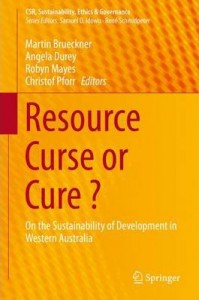An Overview of Mining and the Environment in Western Australia
Authors: Roche, C & Mudd, G

Intro: This chapter identifies and explores the common environmental
(in) Resource Curse or Cure (Brueckner, Durey, Mayes, Pforr)
In June 2011, the Sustainable Regions and Communities Working Group
at Curtin University, Western Australia (WA), held a workshop examining
the challenges and opportunities for sustainable wealth creation in
Western Australia. Unsurprisingly, with WA being one of the world’s
largest resource provinces, much discussion centred around mining and
its economic contributions as well as its social and environmental
costs. The presentations and stimulating discussions on the day gave
rise to this book’s ‘resource curse or cure?’ theme. This edited
collection continues the conversation begun over three decades ago in
State, capital and resources in the north and west of Australia by
Elizabeth Harman and Brian Head. We hope this volume will contribute to,
and expand, the much-needed debate on resource-led development in the
state. While this is a book about WA, the issues addressed in this
volume speak to the broader development and globalisation effects
experienced nationally and indeed internationally. The contributions
show WA’s embeddedness within global markets and its local effects. This
volume highlights the centrality of the periphery that is WA.
Available from the Publisher or your University library – though following academic convention – you can always contact the author directly.